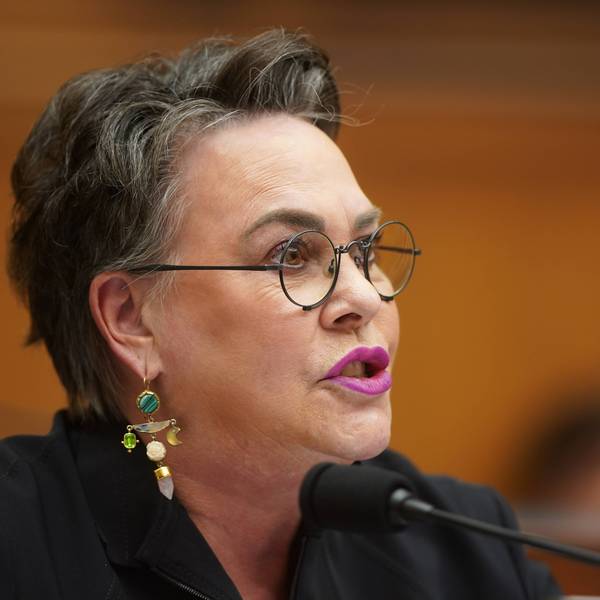One piece of a bipartisan Covid-19 relief package unveiled late Monday would give corporations sweeping and retroactive immunity from coronavirus-related lawsuits, a top Republican priority that civil rights groups, labor unions, and small business owners have decried as a green light for companies to endanger their employees and customers.
A summary (pdf) of the proposed corporate liability protections--which the bipartisan group has attached to much-needed funding for state and local governments--says that employers would not be "subject to liability under federal employment law in Covid-19 exposure cases or change in working conditions related to Covid-19 if the employer was trying to conform to public health standards and guidance." Companies would only be liable in cases of "gross negligence."
The protections, according to the summary, would be retroactive to December 2019 and last until "one year after enactment" or "the end of the coronavirus public health emergency"--whichever comes later. The proposal would also empower the U.S. attorney general to "investigate and bring a civil action" against lawyers for sending "meritless demand letters" on behalf of clients exposed to Covid-19.
As HuffPost reported late Monday, the summary language "tracks closely" with the liability shield proposed by Senate Majority Leader Mitch McConnell (R-Ky.) and Sen. John Cornyn (R-Texas), who have warned of an "epidemic" of coronavirus-related lawsuits that has not materialized.
"The slightly watered-down lawsuit ban would still trump labor laws and stifle OSHA enforcement," noted HuffPost's Arthur Delaney.
The bipartisan group has yet to fully reach an agreement on the details of the liability protections, but several Democrats involved in the negotiations--Sens. Mark Warner (D-Va.), Joe Manchin (D-W.Va.) and Jeanne Shaheen (D-N.H.)--have reportedly indicated a willingness to accept GOP demands.
Rep. Josh Gottheimer (D-N.J.) said Monday that "some tweaks on liability and worker protection" are needed to reach a deal.
Debbie Berkowitz, director of the Worker Safety and Health program at the National Employment Law Project, warned during a press call Monday that, if passed, corporate liability protections would "lead to more illness and death."
The Daily Poster's Andrew Perez, Julia Rock, and David Sirota reported early Tuesday that draft liability legislation circulating on Capitol Hill would "shield employers and healthcare industry executives from legal consequences when their business decisions injure or kill workers, customers, and patients during the Covid-19 outbreak."
The draft, according to The Daily Poster, includes a provision that would "restrict the enforcement of longstanding laws such as the Fair Labor Standards Act of 1938, the Occupational Safety and Health Act of 1970 and the Civil Rights Act of 1964 when companies say they are attempting to comply with governments' coronavirus guidance."
The legislation would also "shield healthcare executives from lawsuits through language copied word-for-word from a statute passed in New York by Democratic Gov. Andrew Cuomo amid a spate of Covid deaths in that state's nursing homes."
Michael Duff, a former National Labor Relations Board official, told The Daily Poster that the draft legislation would have the effect of "substantially immunizing businesses from risky conduct."
"What they want to do in this bill is throw every lawsuit out before it conceivably gets to a jury," said Duff. "It means that a judge has the authority to dismiss a case right upfront. Because there's no way that plaintiffs are going to be able to meet this standard--gross negligence."
It is unclear whether the liability protections will make their way into any final coronavirus relief package. McConnell, who has described corporate immunity provisions as his "red line," has proposed dropping both the liability shield and aid to state and local governments--a suggestion that House Majority Leader Steny Hoyer (D-Md.) said Democrats may be able to stomach, despite the importance of state and local aid.
In addition to the package with liability protections and state and local aid, the bipartisan group late Monday also released a $748 billion bill that includes key priorities such as an extension of emergency unemployment programs, funding for nutrition and rental assistance, and money for vaccine distribution.
Sen. Bernie Sanders (I-Vt.) immediately rejected the bipartisan offer as "totally inadequate" and urged Senate Minority Leader Chuck Schumer (D-N.Y.) to do so as well, citing its omission of direct payments to economically desperate Americans.
"Congress cannot go home for the Christmas holidays until we pass legislation which provides a $1,200 direct payment to working class adults, $2,400 for couples, and a $500 payment to their children," Sanders said in a statement. "This is what Democrats and Republicans did unanimously in March through the CARES Act. This is what we have to do today."




